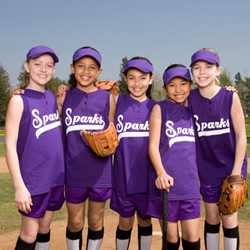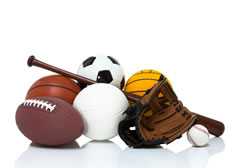Sports Safety
 Taking part in sports and recreation activities is an important part of a healthy, physically active lifestyle for kids. But injuries can, and do, occur. More than 2.6 million children 0-19 years old are treated in the emergency department each year for sports and recreation-related injuries.
Taking part in sports and recreation activities is an important part of a healthy, physically active lifestyle for kids. But injuries can, and do, occur. More than 2.6 million children 0-19 years old are treated in the emergency department each year for sports and recreation-related injuries.
Thankfully, there are steps that parents can take to help make sure kids stay safe on the field, the court, or wherever they play or participate in sports and recreation activities.
Key Prevention Tips
Gear up. When children are active in sports and recreation, make sure they use the right protective gear for their activity, such as helmets, wrist guards, knee or elbow pads.
Use the right stuff. Be sure that sports protective equipment is in good condition, fits appropriately and is worn correctly all the time—for example, avoid missing or broken buckles or compressed or worn padding. Poorly fitting equipment may be uncomfortable and may not offer the best protection.
Get an action plan in place. Be sure your child’s sports program or school has an action plan that includes information on how to teach athletes ways to lower their chances of getting a concussion and other injuries. Get more concussion safety tips.
Pay attention to temperature. Allow time for child athletes to gradually adjust to hot or humid environments to prevent heat-related injuries or illness. Parents and coaches should pay close attention to make sure that players are hydrated and appropriately dressed.
Be a good model. Communicate positive safety messages and serve as a model of safe behavior, including wearing a helmet and following the rules.
HEADS UP to Concussion
 Get HEADS UP to concussion. Get brain injury safety tips and prevention for your sport, including soccer, baseball, softball, football, cheerleading, lacrosse, volleyball, and more.
Get HEADS UP to concussion. Get brain injury safety tips and prevention for your sport, including soccer, baseball, softball, football, cheerleading, lacrosse, volleyball, and more.
- Page last reviewed: March 14, 2017
- Page last updated: March 14, 2017
- Content source:
- Centers for Disease Control and Prevention,
- National Center for Injury Prevention and Control,
- Division of Unintentional Injury Prevention


 ShareCompartir
ShareCompartir